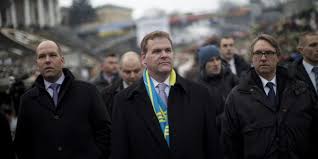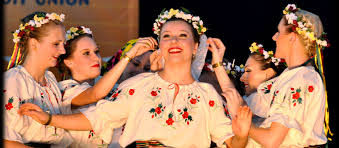March 12, 2014
BURLINGTON, ON.
Canada was one of the first nations to respond to the civil unrest in Kiev and the Russian invasion of Crimea. We recalled our ambassador to Russia, dispatched foreign minister Baird to visit Kiev, booted out a few Russian soldiers visiting us, offered a tiny amount of economic and humanitarian aid and sent over a couple of military observers. This was all announced with the sober deportment which Mr. Harper so capably captures.
The reaction from the substantial Ukrainian diaspora in this country was positive, but they know just what he is doing. They understand this is what good politicians do to sway a potential ethnic voting block into their partisan camp. And it’s not that Mr. Harper couldn’t have done more if he really wanted to pour his love on Ukraine. For example, the financial aid he offered for that economically devastated nation of forty-six million people is an embarrassingly paltry sum. This is from a Canadian government that doesn’t think twice about dumping a couple million bucks advertising a non-existent job training program.
The Ukrainian situation is complicated. Once considered the bread-basket of Europe, the Ukraine has become an economic basket-case, caught between an ever-expanding EU and a newly oil-rich Russia intent on re-establishing the old Soviet Union. It is one of the ironies of civilization that the Ukraine is caught in this potentially matricidal tragedy, having been the cradle of birth for the Russian people. For most of its forty-four thousand-year history the Ukrainian people were made captive by any and all invaders, including Huns, Mongols and Turks, the Poles and Swedish Deluge, the Austrian-Hungarian empire, Hitler and most recently the USSR, where it acquired its current geographical dimensions.
Crimea will become part of the Russian Federation, every reasonable person sees that inevitability. The question is whether Russia is content with its acquisition of this tiny peninsula, or whether it will find pretext to invade other parts of the Ukraine. The entire western effort focused on Crimea is about keeping Mr. Putin’s attention there. This hopefully will stall him in order for the Ukrainians to assemble enough of a defence to hold onto the rest of their country.
Mr. Putin is upset. His dreams of expansion have been set back by the impending Ukrainian decision to favour the EU over his dream of a new USSR. It is truly unfortunate that the west didn’t have the foresight to envision this situation. It might have been possible to more fully invite Russia into the European community of nations, such that Mr. Putin would not feel threatened by a pro-west Ukraine. Russia faces the reality of having lost all of its former Warsaw Pact satellites to the EU, and more importantly to NATO. From Putin’s perspective securing his military base in Crimea was the very minimum he should do.

Canadian Foreign Affairs Minister Baird has traveled to Kiev and worn the colours of the Ukrainian state.
There was a time when Canada was viewed as an honest broker. Lester Pearson won the Nobel Peace prize in 1957, for his trusted independent voice of reason. Today Canada’s foreign policy is about marketing our natural resources, and shamelessly pandering to the ethnic vote back home. So nobody listens to us anymore, and certainly not Mr. Putin. For all the PM’s bluster about the invasion of Crimea, Canada’s only substantial contribution will be through NATO action, should that become necessary.
But we should not deprecate the fact that we were among the first to get involved. We closed our embassy to register our disapproval at the slaughter of protesters. Then, following the flight of besieged president Yanukoyvich, we provided early moral support for the new administration in Kiev, Mr. Harper has a habit of jumping into situations early and this time he got it right and demonstrated leadership.
And there is a lesson from Crimea for Mr. Harper – in fact for all of us. Quebec having just announced elections is busy preparing for its new sovereignty referendum, should the PQ win. In response, it appears the PM has come to life, and begun meeting with parliamentary opposition leaders and provincial premiers about his next steps. After all Crimea’s future in the Ukraine will be determined by a unilateral referendum, not unlike those used in the last two Quebec votes on sovereignty.
As we see in Crimea, events can move quickly. So it is prudent for the PM to at least ponder the imponderables, knowing there is a probability they could become reality in the event of a strong majority vote for sovereignty. For example the northern aboriginals in Quebec, whose treaties are with Canada, may wish to stay in Canada – to separate from a separate Quebec. Would the rest of Canada support them, militarily if necessary? Would there be involvement by other nations – the USA or France? Oh what a tangled web they’ll weave – and all they want is to secede.
 Ray Rivers writes weekly on both federal and provincial politics, applying his more than 25 years as a federal bureaucrat to his thinking. Rivers was a candidate for provincial office in Burlington where he ran against Cam Jackson in 1995, the year Mike Harris and the Common Sense Revolution swept the province. He developed the current policy process for the Ontario Liberal Party.
Ray Rivers writes weekly on both federal and provincial politics, applying his more than 25 years as a federal bureaucrat to his thinking. Rivers was a candidate for provincial office in Burlington where he ran against Cam Jackson in 1995, the year Mike Harris and the Common Sense Revolution swept the province. He developed the current policy process for the Ontario Liberal Party.
Background links:
Russia vs Nazis Legal Issues in Ukraine Russian View Kissinger Ukrainian Feed Mulroney on Putin
Losing Putin Russia Lost the War Ukrainian Diaspora Ukraine History Yanukoyvich Corruption





















Dale, I rather enjoy Ray’s columns where he is pounding down the tracks in one direction, huffing and puffing and blowing out hot air and steam. It gives me an opportunity to respond and balance the record. His columns that I most dislike are the ones where I find myself mostly in agreement with him. Fortunately, those are few and far between.
One common theme I have noted; wherever Mr. Harper happens to be in the world, even from an airplane (Mile High Club Jan 30), he has the uncanny ability to nail Mr. Rivers cornflakes dead centre every time!
Evidence of Canada being judged as unfair–Canada has requested a Security Council seat about once a decade for the last 60 years and has always won a seat when it wanted one – until the onset of Harper in 2010.
It is true that United Arab Emirates lobbied against Canada because they felt Harper was unfair by refusing to open up more landing slots in Toronto to a Dubai based airline. Subsequently the UAE evicted Canada from their Armed Forces base, denied landing rights to Peter MacKay and others while in flight, and impinged visas on Canadians travelling to UAE. Seemingly these were punitive measures.
Since April 2013 visa conditions have reverted to their previous form and the two nations are apparently entering into a nuclear cooperation deal. Would Chretien or Trudeau (Justin) have appeased the Arab Emirates to a seat on the council? Perhaps, but should they?
I’m not convinced that this is strong evidence that Canada is deemed to be “unfair” by world leaders. Seems more like sour grapes.
Ray: give Harper a break and get off your anti-Harper, anti-conservative rant. Put a little objectivity into your POV
Dale,
Thanks for your comment – I could swear I praised him for his leadership.
Of course, we ought not forget “dat little guy from Shawinigan”, on his bumbling Middle Eastern tour, serially pissing off both the Israelis and the Palestinians with his verbal gaffes. Not an easy feat to pull off, and not the highlight of the so-called era of the honest broker.
In your own words, “The Ukrainian situation is complicated.” So why use the plight of those unfortunate people for one of your anti-Harper rants.
As to your comment: “There was a time when Canada was viewed as an honest broker. Lester Pearson won the Nobel Peace prize in 1957, for his trusted independent voice of reason.” I was around in 1957, and I can assure you Canada was NOT independent then. Canada was as staunch an Israeli ally then as now–but Arab countries trusted us to be fair as peacekeepers. I haven’t hear ANY international leader accuse Canada of not being fair.
It is odd that, on the one hand, you lash Mr. Harper for spending money on advertising a “non-existent” job program, but you also berate him for not spending more money in aid to a possibly non-existent independent country, certainly one that, at the moment has only an interim government. The prudent course is to wait and see if the political scene settles down in the Ukraine. After all, why should we risk simply fattening Mr. Putin’s bulging personal bank accounts with our foreign aid.
It reminds me of the Liberal position when the Tories came to power in the recession. The Conservatives were not spending enough to revive the economy cawed the Liberals and then when the economy recovered the Tories were excoriated for running a deficit.
Mr. Pearson deserved his place in history for his diplomatic initiative through the U.N. when that organization still counted for something and was still regarded as a useful mechanism for peace, 50 years ago. Times have changed and Canada has changed with those times. It is a complete Liberal myth that Canada had more clout in the world under Liberal governments, which I call the fallacy of the “honest broker”. Mr. Harper is widely respected for his principled and clear stands on international issues.
Since Canada is home to so many different ethnic groups there could hardly be anything that was done abroad that could not be painted as political opportunism, pandering to the ethnic vote. The test is whether the thing being done is a good thing with good outcomes. In the case of the Ukraine, it is good thing that we hope has a good outcome.
Still on the subject of pandering, it is worth remembering that Mr. Harper has made it very clear that Canada supports Israel in its struggles in the Middle-East. And whether you agree with this position or not, he has traded the votes of the one million strong Muslim Canadians for a pocketful of Jewish votes (most of the 300,000 Jews tend to vote Liberal). Mr. Trudeau, on the other hand, is only too happy to show up at Muslim events whose organizers have ambiguous and perhaps dubious intentions in mind.